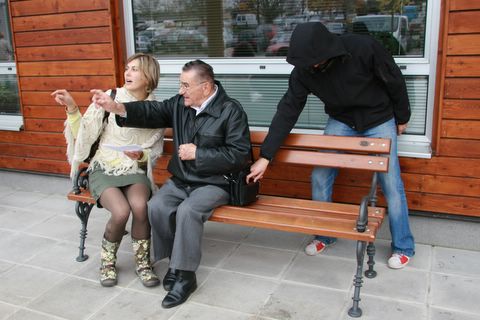The residents of the old people's home in Fužine (Ljubljana) today received a visit from police officers. The chief of the local police district had prepared a talk for them with extremely useful information on self-protection measures for greater personal security and the security of their property. They were particularly enthusiastic to receive the brochure entitled Don't forget about security, containing preventive advice for the elderly, which was presented in detail by representatives of the General Police Directorate and the Ljubljana Police Directorate.
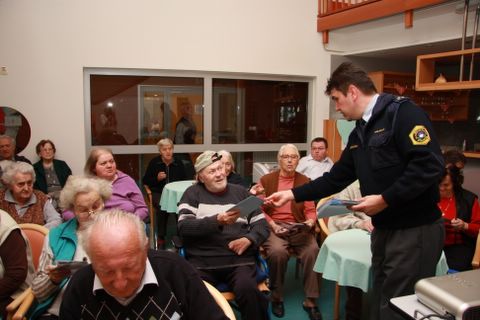
Talks by police officers and advice for citizens are of course nothing new. Police district chiefs at police stations are responsible in local communities for preventive and community-oriented police work and therefore carry out numerous preventive projects and activities. The police carry out approximately 10,000 such projects and activities every year. They are aimed at a variety of target groups and directed towards all those areas where security issues are particularly urgent.
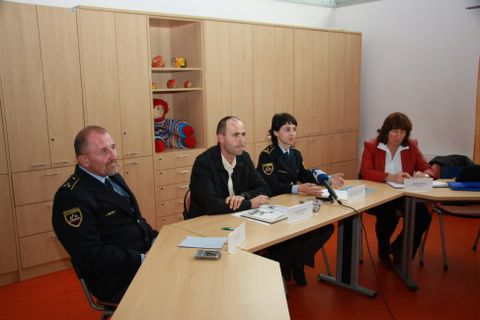
In the photograph: Police Inspector Ivan Mezek, Detective Inspector Matija Breznik, both from the Ljubljana Police Directorate, Melita Globočnik Trnovšek, representing the GPD Uniformed Police Directorate, and Nuška Tavčar, police public relations representative.
According to Melita Globočnik Trnovšek of the GPD Uniformed Police Directorate, the elderly are among the more vulnerable groups of the population and therefore particular attention needs to be devoted to them. We want them to be as well prepared as possible for potentially dangerous situations and to avoid becoming victims of criminal offences.
Statistics show that people aged over 64 are the victims of approximately 5% of all criminal offences. Last year (figures for 2006 are given in brackets) the police dealt with 5,070 (4637) criminal offences affecting elderly people (aged over 64). Most often they are victims of theft (39.5%) and aggravated theft (32.6%) but they are also victims of threats to personal safety (7.3%) and fraud (4.3%). Victims include roughly the same number of men and women. In the first ten months of this year, persons over 64 were the victims of approximately 24% of all thefts in Slovenia and accounted for approximately 15% of all victims suffering minor and serious physical injuries. In the first ten months of this year 2,587 people aged over 64 were involved in road accidents, which is 7.3% of all those involved in road accidents (compared to 6.8% in the same period last year). The majority of elderly people involved in accidents (72.2%) were not physically injured.
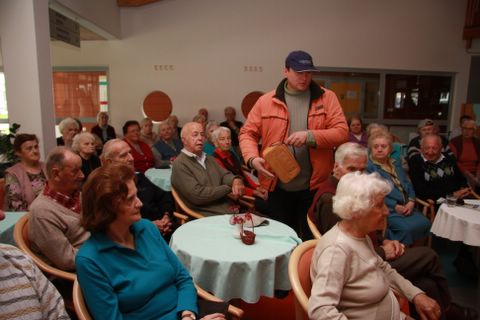
Participants were given live demonstrations of how quickly a thief can remove a handbag from a shoulder or a wallet from a pocket if we are not sufficiently attentive and careful.
The largest number of criminal offences in which the victims are elderly persons take place in the area of the Ljubljana Police Directorate. Last year there were 2,541 such criminal offences (2,375 in 2006). The Ljubljana Police Directorate is followed by the Maribor Police Directorate with 781 (643), while the smallest number of criminal offences in which victims were elderly persons was in the Slovenj Gradec Police Directorate, where the figure last year was 63 (48 in 2006).
Since we have ascertained that road safety and personal safety are the most problematic areas for the elderly, most preventive activities were directed towards the prevention of criminal offences (64.2%) or dealing with the elderly as victims (how they should act when they become the victims of thefts or burglaries, for example) and the provision of road safety advice (16.7%), for example how they should behave as pedestrians.
The majority of preventive activities for the elderly in recent years have taken place in the form of advice and warnings (75.1%) or as education (10.8%). Additionally, as part of the Don't forget about security project, 10,000 copies of a brochure with the same title were printed this year. This brochure draws the attention of the elderly to the need for caution and warns them to pay attention to their own security and the security of their property. Police district chiefs visit the elderly at home or in old people's homes and distribute the brochures in the course of direct conversations with them. This approach also gives citizens the opportunity to get to know the chief of their police district.
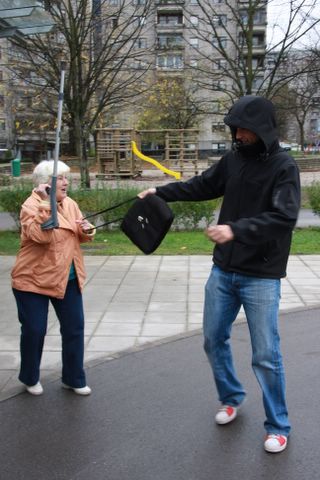
The brochure lists the most common circumstances and forms of criminal offences and offers advice on how citizens can stop themselves become the victims of these offences. It contains advice relating to security in public places (e.g. carrying wallets, handbags, luggage), travelling by bus or train (e.g. where to sit, whom to ask for help), precautions to observe when withdrawing money from a cash machine or making purchases, how to deal with callers (it describes the commonest ruses used by criminals, technical methods of home security, how to act if someone calls at your home), and draws attention to the advantages of good neighbourly relations, and so on.
